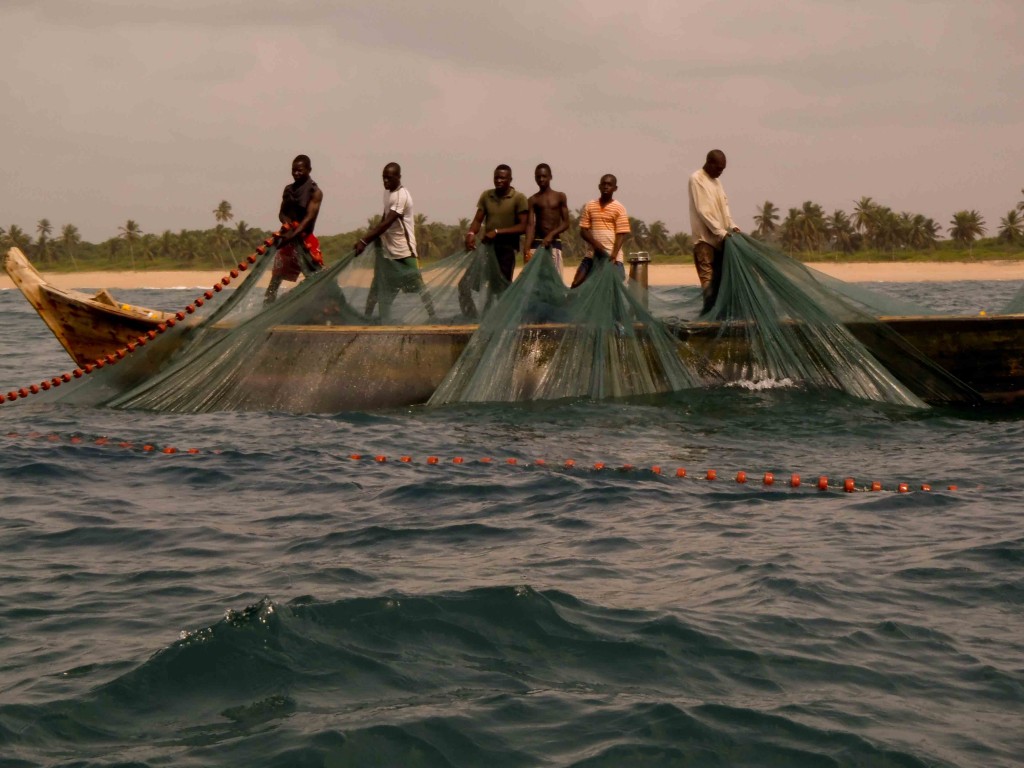by Charlie Gough, Marine Research Coordinator, Madagascar& Ghana
What makes two communities that live over 5000km apart and different oceans struggle daily with the same problems? When you know that both communities live in coastal villages where the population doubles every 20 years, and the primary source of both food and income is the sea – you will understand that the problems that they face arise primarily from overfishing.
Blue Ventures has worked for the last 10 years in western Madagascar with Vezo fishing communities to develop innovative and sustainable solutions to the fisheries problems that they face in small scale traditional fisheries.
Ghana, western Africa borders the Atlantic Ocean in the Gulf of Guinea and has become increasingly affluent through the exploitation of its natural resources such as gold, timber and oil. However, the western region of Ghana is home to the Fante people, who similarly to the Vezo, are traditionally reliant on the continued productivity of the sea for both income and survival. The Ghanaian fishermen have been lucky, there is a coastal upwelling that occurs twice a year, from June to September and a second smaller season between December and February. The cold nutrient rich waters bring with them high levels of productivity in the form of plankton blooms followed by Herrings and Sardines and next to them Mackerel and Tuna. They also have a coastline replete with diverse habitats of rocky reef, mud, sand and estuarine lagoons, where they can fish out of season.
However, despite the complexity and diversity of habitats and fishing grounds, the relentless exploitation of these resources by humans has started to have a marked effect on the productivity of these systems, and the reports of decline that are being made by many fishermen are similar to those heard throughout Madagascar, and no doubt small scale fisheries worldwide.
“Before we would catch plenty of fish, now we catch the same type of fish but they are becoming less and less,” laments Nana Kwesi-Ayaah the Chief fisherman of Princess Aketechi, a small fishing town near to the southern point of Ghana.
Despite a number of forest reserves and protected wetland areas, there are currently no marine protected areas in the country. Blue Ventures researchers are working together with the Coastal Resources Centre (CRC), University of Rhode Island (URI) in a USAID funded project to help develop plans for a network of marine protected areas in the western region of Ghana that would be co-managed with local fishing communities.
“Traditionally Ghana has used the top-down approach to natural resource management,” explains George Hutchful, National Policy Coordinator for CRC –Ghana, “however with open access fisheries we are seeing that this approach doesn’t work, what we need is support from the fishermen themselves.”
What is being suggested by CRC and Blue Ventures is to trial community co-management of protected areas, giving local fishermen and fishing communities more power to decide how to manage local fishing grounds. Also empowering them to enforce local and national fisheries laws that could help them to protect their resources for the future.
“What we have seen from working with local communities in Madagascar is that once fishermen see for themselves the benefits of protection, there is increased compliance with fisheries management,” commented Yann Frejaville, Fisheries scientist, Blue Ventures.
Local chiefs currently lack the power to enforce fisheries legislation on fishers acting illegally in their own villages, “People use lights to attract the Herrings up from the depths, which means the Tuna have nothing to eat and so now they are not so many as before,” says Nana Frederick Chief fisherman in Butre, “Others use battery acid (Carbide) or ground mosquito coils in plastic bags, dotted with holes and tied to the bottom of their nets. These toxic substances leak out of the plastic bags into the water and repel the fish upwards from the depths into the fishermen’s awaiting net” elaborates Frederick. Other fishermen also tell us stories of people blasting the fish from the waters using dynamite, which comes from illegal mining operations in the region.
What appears to be universal in small fishing communities, whether in Ghana or Madagascar is the necessity for local fishermen and their leaders to feel empowered to make a difference in their own communities, and ostracise these smaller groups that are practising unsustainable and destructive fishing methods.



